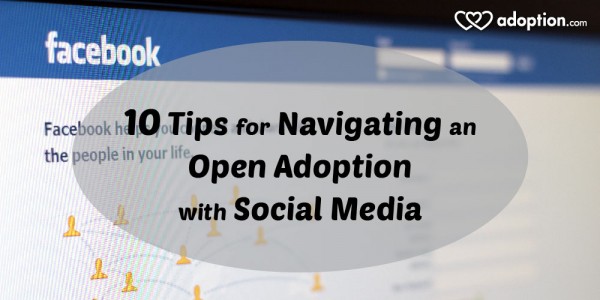The last decade has brought leaps and bounds in the adoption community as adoptions started opening up and relationships between adoptive parents, birth parents, and adoptees began to develop. Along with these relationship advances, technology and social media have also continued to develop and aided in adoption communication and relationships. Navigating this new technology and social media can help further the relationships.
Because we are in a decade of unprecedented technological advances, it can be difficult to incorporate these with open adoptions. Facebook and other social media sites are lessening privacy and expanding world-wide communication. Birth and adoptive parents can now follow or befriend each other in cyberland.
For both adoptive couples and birth parents, the question of whether to involve social media should take into consideration the openness of the relationship. As with most adoption questions, open and honest communication is typically the answer. Some birth parents or adoptive parents prefer not to engage in a relationship over Facebook or other social media for their own privacy. It’s typically best to talk about feelings and make a decision based on your personal relationship and not the relationship you see others having.
Boundaries should be established right from the beginning about what kind of content is acceptable for both parties to be posting. Some birth mothers choose to keep the fact that they had a baby private and away from social media. That fact should be respected when adoptive parents post any sort of content on Facebook. Some adoptive parents also choose to keep their children’s photos or names away from social media, and birth families should also be respectful of that.
To navigate these new, uncharted areas, here are some other suggestions from both adoptive couples and birth parents to make things easier.
For adoptive couples:
- When posting pictures of ultrasounds or pre-placement photos, make sure to ask for permission from the birth mother first. This is a very tender time before any legal contracts have been made, and the birth mother may feel like this is violating her space. It’s hard to contain your excitement for the new arrival, but be sensitive to the birth mother as she is still transitioning from her baby to your baby.
- Along the same lines, be sensitive when posting pictures of your new baby soon after their birth. This is a period of intense mourning and grief, and too much celebration on your part could seem like mockery to her pain. But it’s natural to want to share your joy with the world, so just remember the birth mother’s feelings as you post. Some adoptive couples don’t post pictures at all, while some with extremely open relationships go as far as tagging their birth mother in pictures. Some subtler options would include just mentioning your birth mother (not by name) and your appreciation for her in your post.
- Make sure to censor comments made by friends and families in reference to adoption, the adoptee or the birth family. If you are friends with the birth family, chances are they will be want to see everything you post on Facebook, which means everything that gets posted by others. Your friends and family may not understand the dynamics of open adoption and may unintentionally say some hurtful things.
- Refrain from complaining about your children on Facebook. It is one of the fastest and easiest ways to upset birth parents. They understand that life with children is not always pleasant, but when you write derogatory posts on Facebook, it can send the message that you don’t want, love, or appreciate your children.
- The number one complaint from birth mothers about Facebook and adoption is finding out important information about their birth child from Facebook instead of being personally told by the adoptive couple. Important information could include anything from the family moving or a child’s injury to a huge milestone accomplished by the child. Birth mothers feel like they should be one of the first to hear about a huge announcement, instead of being among the 500 friends who hear about it from social media.
For birth mothers and families:
- If you choose to post publicly about your adoption on social media, it would be considerate to ask permission from the adoptive couple before posting any of their information or their child’s information. Many families may also choose to keep their adoption out of the spotlight, and as such, wouldn’t want Facebook posts about placement, birth mothers, or other aspects of adoption put on public display.
- You may think twice about splashing any intense emotion—particularly while grieving—on Facebook for the adoptive couple to read. They love you and are worried about your feelings, so if you’re in the “anger” stage of the grief cycle and let that all spill out on Facebook, that would be very hard for the adoptive couple to hear.
- Angry feelings about the birth father, birth mother or any other birth family member probably shouldn’t be put on Facebook, either. The adoptive couple most likely loves both of you, and it’s stressful for them to be caught in the middle. Remember, this stuff is also archived for the child to possibly read.
- It’s also a good idea to ask the adoptive couple’s permission before posting pictures of your–their–child. Remember, they’re trying to censor and protect their child from potential dangers of the Internet. Some families also wish to shield their children from social media by not posting their full names, or other information about them.
- It probably goes without saying, but criticizing the adoptive couple on social media—venting your frustrations with them, undermining their parenting techniques, etc.—will only hurt the relationship. Just as you expect them to do for you, please respect their roles as the child’s parents and practice the Golden Rule.

